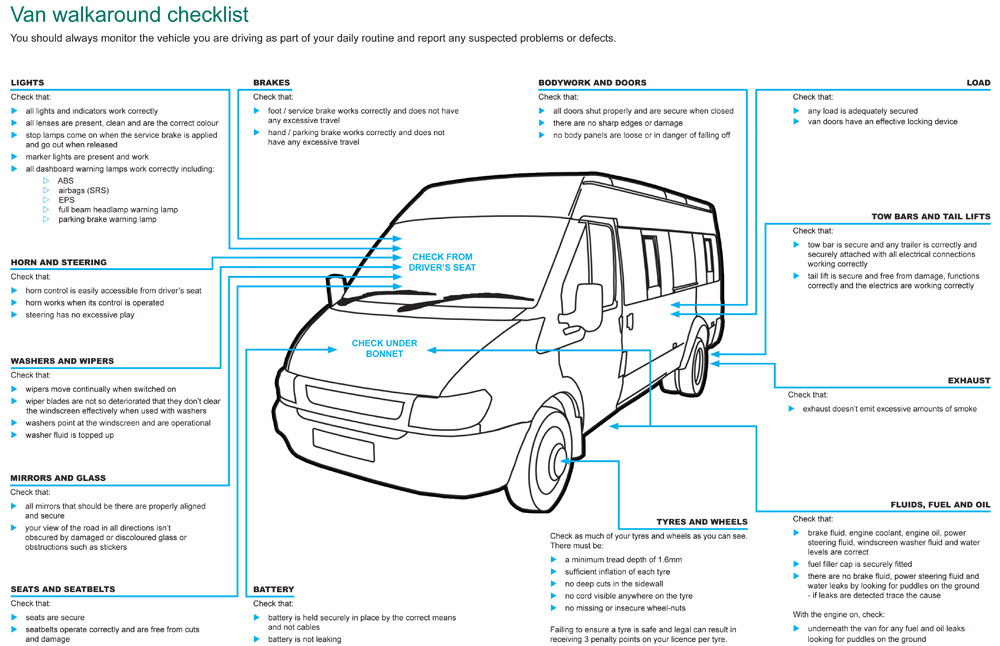
At any one moment there are more 3.5 million vans or Light Goods Vehicles (LGVs) registered for use in businesses across the UK. This number is growing annually, which means that the 'van', in all its uses is becoming commercially indispensable in economic growth.
The number of vans on UK roads actually outnumbers the number of lorries by more than 7 to 1, so for every 100 vans there are only about 14 lorries! That's quite a difference, but illustrates how important vans actually are to UK business in general.
The DVSA (Driver and Vehicle Standards Agency ) stops more than 13,000 LGVs annually as part of its national roadside mechanical checks. As a van owner or operator, a vehicle that doesn’t comply with DVSA regulations will be declared unroadworthy and this can cause crucial financial loss.
Taking Care of Your Van
All vans with a gross vehicle weight of less than 3.5 tonnes are categorised as either Class 4 or Class 7 under the UK MOT scheme. Any van with a gross vehicle weight of more than 3.5 tonnes is not classified as a LGV. These vans require a different operator’s licence, increased regulation and costs. As a LGV operator, you CANNOT break the gross and axle weight limits of your vehicle, remembering that the total vehicle weight includes the combined weight of your van’s driver, passengers, load and fuel. If you do break this weight, your vehicle will be prevented from using UK roads and you will face a fine.
Across the EU, light goods vehicles are known as light commercial vehicles (LCVs) so be careful over this confusion.
Van Operator Checklist
Daily Van Checks
- Doing a van 'walkaround' before using a van to record any damage or defects - the British Army pride themselves on 'walkarounds' when handing over vehicles regiment to regiment. You'll also often see bus drivers doing it when they change shift. It's a sign of a well organised business and of professionalism. It's very common.
- If you do identify any defects get them repaired immediately and if necessary book the van a visit to the garage.
 Van Servicing
Van Servicing
- Service your van regularly as recommended by the vehicle manufacturer.
- If the van is heavily used then this point is even more important - yes it may seem like you are up-fronting immediate costs for the service but long term it will keep the vehicle in tip-top condition and save you money.
- Typical technical problems for heavily used vans are poor brakes, exhaust and suspension so get the van frequently checked and keep a record of everything including defects
- Get organised - become used to using Spreadsheets. You'll be surprised how many great guides there are on Youtube and Google to help you improve your IT skills. Using spreadsheets will keep you organised - record all the faults with vans, manage your staff, and vehicle taxing, MOT's and renewal dates.
Health and Safety Van
- Keep your van(s) clean and tidy. Drivers should also take responsibility for this and hand vehicles over to other drivers in a tidy condition. It's professional.
- One of the most common stereotypes of van drivers are vans which constantly break the speed limits. It may be a good idea to fit your vans with speed limiters.
- Parking and reversing sensors can be a good investment which protects your vehicles from unnecessary prangs and bumps and obviously provides added protection to pedestrians.
- Confirm that the documents i.e. driving licences of your drivers are all up-to-date and valid.
- Get into the habit of checking your drivers' licences quarterly or even monthly as anyone on 6 or 9 points are at risk of being banned and may require some awareness training or support.
- Be prepared to give newly qualified van drivers added support - they may not say it but more often than not they won't be as confident as their more experienced peers.
- Ask all your drivers to make a short written declaration explaining they’re entitled to drive and have no driving related health problems, whether this includes visual impairments, diabetes, or breathing or heart problems.
Van Driver Compliance
- Drivers should understand and be compliant with current LGV (Light Goods Vehicle) regulations such as:
- EU working time directive
- Speed limits including those abroad
- Vehicle weight
- Towing trailers
- Mobile phone use
- The vehicle weight is crucial - you run the risk of being penalised if the vehicle is overweight. Ensure the van is at its correct weight. This includes the driver, load, fuel and any passengers.
Employing Van Drivers
- An agency can do this for you or you can do it yourself. An agency would be more expensive (but less time consuming!) so many SME's opt to to do it without an agency. If you do recruit yourself, you should be mindful of obtaining adequate references for your drivers from previous employees.
- Set up an account on the Universal Jobmatch website - it's free to advertise jobs there and all vacancies are advertised for free in UK jobcentres.
- Make sure you take more than 1 example of identification from all your drivers, so driving licence, and passports or birth certificate, or an official letter from a bank or mortgage lender are good ones.
For more information, visit the UK Gov Driving a van: the basics website.



 United Kingdom
United Kingdom Republic of Ireland
Republic of Ireland Polska
Polska România
România Republica Moldova
Republica Moldova Российская Федерация
Российская Федерация Украина
Украина Республика Беларусь
Республика Беларусь Литва
Литва Латвия
Латвия Эстония
Эстония Deutschland
Deutschland Schweiz
Schweiz Österreich
Österreich Lichtenstein
Lichtenstein Belgien
Belgien Luxemburg
Luxemburg Magyarország
Magyarország Česká republika
Česká republika Slovenská republika.
Slovenská republika. España
España Italia
Italia Bulgaria
Bulgaria









